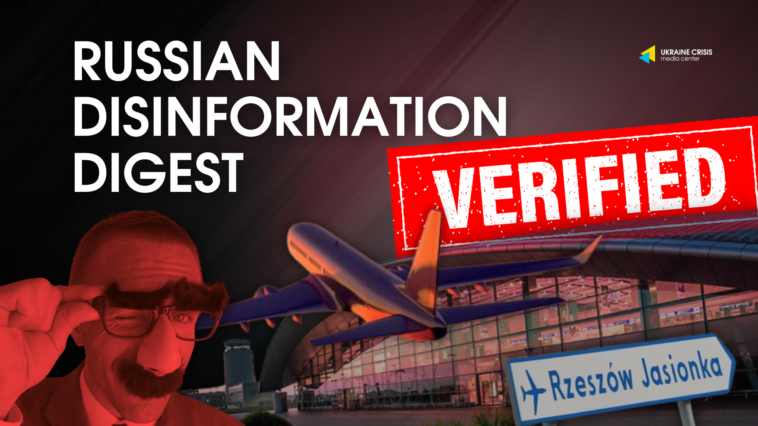Written by Anton Khimiak, UCMC/HWAG analyst
Propaganda Digest: This is our weekly analysis that exposes the most exaggerated, misleading, and outrageous rhetoric from recent Russian media sources, aimed at promoting critical thinking to better debunk the manipulation of Russian propaganda.
Recent arrests in Europe, including Germany and Poland, have revealed alleged Russian espionage operations and plans to commit violent acts on European soil. The arrests have sparked concerns about the extent of Russian espionage and infiltration in the West, with suspects accused of spying on military sites, planning attacks on military infrastructure, and targeting high-profile individuals, such as the president of Ukraine. At the same time, Russian propagandists try to change an angle of perception on the situation in order to mitigate the potential consequences for their agent networks.
Russian Narrative: What about Ukraine?
Vladimir Kornilov, Russian propagandist (128, 885 subscribers)
”It can be assumed that the unfortunate Pole was recruited not by the Russians at all, but by the Ukrainian special services, posing as Russians. Agree, the message about “preparing an assassination attempt on Zelensky” has now sparkled with new colours!”
Elena Petrova, Russian journalist
“The German authorities are well aware of the Russian Germans’ support for Russia in the Ukraine issue. According to German media, less than a third of immigrants from the USSR support the continuation of hostilities and assistance to Ukraine from Germany.”
Sergey Markov, Russian propagandist (68, 095 subscribers)
“Are the intelligence services of Ukraine, the United States, or Britain preparing terrorist attacks on German territory to blame Russia for them? As they have already done a terrorist attack on the Nord Stream gas pipeline. But are they going to blame Russia for the new terrorist attack?”
Verified: : One of the classic narratives of Russian propaganda, which also appeared in this case, discredits the Ukrainian authorities. The Kremlin-controlled media is trying to use Whataboutism to misrepresent the nature of these arrests.
Propagandists are trying to shift the emphasis on the arrests in order not to admit to the readers Russia’s responsibility for the use of spies in Europe. At the same time, the very fact of the detention of Russian spies discredits the strength of the Russian intelligence services, which is why propagandists are moving the shooters to Ukraine
Moreover, caught Russian spies are an excellent opportunity to accuse Kyiv of preparing for sabotage, terrorist attacks or crimes on the territory of the EU to reduce trust in Ukraine among European society. Just as Russian tanks fired on civilians during the war in Donbas but blamed Ukraine for it.
Russian Narrative: Old, good escalation
Sergey Markov, Russian propagandist (68, 095 subscribers):
“The head of the German Foreign Ministry made a hazardous statement; she said that Russia could be preparing terrorist attacks on German territory. And she demanded to resist the “transfer of terror to Germany,” which Putin is allegedly preparing. Is this just rabid Russophobic demagoguery from Berbock?”
Vladimir Kornilov, Russian propagandist (on Russia Today, 163, 289 subscribers):
“Moreover, I am sure that Russia has every right to collect, by all available and not entirely accessible methods, information about the methods of killing Russian soldiers that are being taught to Ukrainian terrorists at this base. They are being prepared against us! What restrictions might there be?”
Kristina Ismagilova, Russian scientist (18, 387 subscribers):
“For ordinary citizens of the republic, this is a rather serious wake-up call, since previously there were no high-profile espionage cases against the Poles. Frankly, given the scale of the arrested “Russian agents” in Poland, it was a matter of time before the state took on its own citizens. “
Verified: : Another classic narrative for Russian propaganda: the threat of escalation. The primary purpose of such messages is to sow panic and fear among European society.
For this, direct threats and “horror stories” about potential repressions by the governments of European countries are used. This should lead to a split within the target countries and create distrust in the authorities.
Russia uses this kind of intimidation whenever it finds itself in an uncomfortable situation. For example, all the Russian forces have threatened the West with the start of a war because of the recent large-scale NATO exercises or when Ukrainian troops attacked Russian territory.


